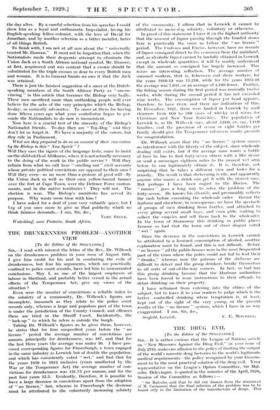THE DRUNKENNESS PROBLEM—ANOTHER VIEW
[To the Editor of the SPECTATOR.]
Sin,—I read with interest the letter of the Rev. Dr. Willeock on the drunkenness problem in your issue of August 10th. I give him credit for his zeal in combating the evils of drunkenness, but fear his arguments, which are practically confined to police court records, have led him to unwarranted conclusions. May I, as one of the largest employers of labour in Shetland, and probably better versed in the actual effects of the Temperance Act, give my views of the situation ?
Even were the number of convictions a reliable index to the sobriety of a community, Dr. Willcock's figures are incomplete, inasmuch as they relate to time police court records only, whereas a large and populous part of the town is under the jurisdiction of the County Council, and offences there are tried in the Sheriff Court. Incidentally, the lock-up " to which he refers is outside the burgh.
Taking Dr. Willcock's figures as he gives them, however, he states that for four unspecified years before the no licence " period the average number of convictions per annum, principally for drunkenness, was 187, and that for the last three years the average was under 30. I have pro- cured corresponding figures for Fraserburgh, a town engaged in the same industry as Lerwick but of double the population, and which has consistently voted " wet," and find that for the years 1910 to 1913 inclusive (years unaffected by the War or the Temperance Act) the average number of con- victions for drunkenness was 131.75 per annum, and for the past four years 35.5. Evidently, therefore, it is possible to have a large decrease in convictions apart from the adoption of no licence," but, whereas in Fraserburgh the decrease . must be attributed to the voluntarily increasing sobriety of the community, I affirm that in Lerwick it cannot be attributed to inerersing sobriety, voluntary or otherwise.
In proof of this statement I have it on the highest authority that the amount of liquor passing through the bonded stores here is practically the same as before the " no licence " period. The Customs and Excise, however, have no records of liquor consigned direct to the consumer from the mainland, and, as alcoholic liquor cannot he lawfully obtained in Lerwick except in wholesale quantities, it will he readily understood that the amount so consigned has largely increased. This raises an interesting reflection. The average number of seasonal workers, that is, fishermen and shore workers, for the years 1910-13 was 11,210, while for the years 1925-28 the average was 7,041, or an average of 4,169 fewer. Further, the fishing season during the first period was normally twelve weeks, while during the second period it has not exceeded nine weeks. The consumption of liquor per head appears, therefore, to have risen, and there are indications of this. In December, 1927, there were landed in Lerwick by mail steamers from 600 to 700 cases of whisky told wires for Christmas and New Year festivities. The population of Lerwick is, as Dr. Willecck says, about 5,000, or, say, 1,000 families, and the provision of seven or eight bottles per family should give the Temperance reformers scanty grounds for congratulation.
Dr. Willcock avers that the " no licence " system causes no interference with the liberty of the subject, since wholesale dealing still exists, but if the average man wants a bottle of beer he has to find forty-seven others with a like desire or send a messenger eighteen miles to the nearest wet. area before he can legitimately obtain it. It is, therefore, not surprising that he takes a different view and looks for a remedy. . The result is that shebecning is rife, and apparently anyone who wants a drink can get it with the utmost ease. But perhaps I have been unjust to the Doctor. The " runner" goes a long way to solve the problem of the forty-seven. He knows his clientele, and presumably collects the cash before, executing the wholesale order. Round the harbour and elsewhere, in consequence, we have the spectacle of groups of men drinking from bottles, and attached to every group several small boys, and even girls, waiting to collect the empties, and sell them back to the wholesaler. In the town of Stornoway this drinking in public places became so bad that the town out of sheer disgust voted " wet " again.
Since time decrease in the convictions in Lerwick cannot be attributed to a lessened consumption of alcohol, another explanation must be found, and this is not difficult. Before - no licence " all the public-houses were in the most frequented part of the town where the police could not fail to find their " drunks," whereas now the patrons of the shebeens arc difficult to detect and the group drinkers betake themselves to all sorts of out-of-the-way corners. In fact, so bad has this group drinking become that the Harbour authorities have been forced to issue instructions to their officials to debar drinking on their property.
I have refrained from entering into the ethics of the subject, but to leave it to your readers to judge which is the better—controlled drinking where temptation is, at least, kept out of the sight of the very young, or the present results of the " no licence " system, which I have in no way exaggerated.—I am, Sir, &c.,
































 Previous page
Previous page